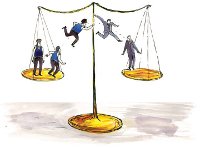
Rarely does an RCMP officer leave the Force to become a lawyer. But after serving nearly seven years in uniform and plain clothes in rural Alberta and southern Ontario respectively, that’s what I decided to do. When I was discussing the career move with my then-colleagues, a drug squad member announced that if I became a defence attorney, I would not be welcome at his poker games. Although he was laughing, he was clearly serious about it.
I am not a defence attorney yet, but I am a third-year law student at the University of Western Ontario. As a former RCMP officer, I am not easily shocked, but I was surprised at how my fellow students and even professors perceived me. During my first week of classes, one professor actually told me — politely — not to intimidate the other students with my knowledge.
Truth be told, lawyers and the police don’t like each other much. At best, there is a profound misunderstanding between the two professions; at worst, they have downright contempt for one another.
Justice suffers as a result. It creates needless delays and feeds the public’s aversion to the justice system. Cop-lawyer dramas may be a staple of popular culture, but the real life animosity between lawyers and police must end.
Defence lawyers are trained to question authority and act as a check on state power. But it is easy for them to fall into the trap of seeing the police as mindless lazy thugs or reckless adrenaline junkies with no respect for human rights. Each time a police officer does wrong, it merely reinforces the negative stereotype.
The Vancouver International Airport taser incident is a case in point. Personally, I am disgusted by the actions of the four Mounties and hope the Braidwood Inquiry will get to the truth about the death of Robert Dziekanski.
For their part, the police view lawyers as prima facie crooked. When a defence lawyer gets “done” criminally, the police world privately celebrates their misery and humiliation. Criminal defence lawyers are either parasites or incompetent “yellow page” hacks.
Prosecutors fare little better. In the police mindset, there are too many wishy-washy Crown attorneys who only read their briefs 10 minutes before court and plead out the docket to make a golf game with members of the defence bar. Whichever side they’re on, lawyers are a great source of aggravation, a sentiment that’s reinforced with each push on a photocopier button by an officer making disclosure, but who would much rather be on the street policing.
The reality is that lawyers and police have different roles and face different challenges. Lawyers are, above all else, advocates; this includes Crown attorneys in their role as ministers of justice. They spend years at school honing their analytical skills at great financial cost and they do not have the luxury of standing still if they want to make a living.
The police, on the other hand, are responsible for keeping the peace. They regularly put themselves in real danger and must be willing to employ violence, even killing, in a lawful controlled way. Policing is a dirty, stressful profession where its members deal with the worst 10 per cent of society 90 percent of the time.
Yet, the professions are similar. Good officers know their best tool is their mouth. Negotiating skills count just like in the legal profession. And the stakes are high for both because their decisions affect real people, often with substantial consequences.
Human nature dictates that there will always be flat-footed, inept police officers and sleazy, unethical lawyers. But the best of each profession are driven by a fighting spirit and share the qualities of compassion and a sense of fairness expressed through the rule of law. The public demands no less.

